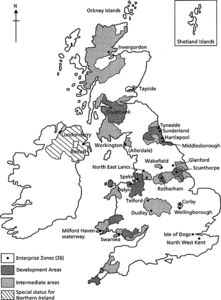‘Place-oriented policies that are a tool of regional development, and refer to geographically targeted areas chosen for development that are designated on the basis of unemployment, poverty, population, age of housing stock, and other criteria. Firms that locate in the area and create jobs are given tax credits, abatements, and exemptions. The underlying assumption is that firms and employees in the zone area benefit because of a reduction in the price of capital and/or labour, and there is expanded investment and employment generation through deregulation’ (S. Sridhar (2004) Nat. Inst. Public Finance & Prop. N. Delhi W. Paper 19). In a study of US enterprise zones, A. Peters and P. Fisher (2002) find that while early econometric studies of the effects of state enterprise zones usually found positive results, more recent results have been much less favourable.

UK Enterprise zones
- eutaxitic structure
- eutectic mixture
- eutectic point
- eutectic system
- Eutelsat 172B
- EUTELSAT IGO
- euthanasia
- Eutheria
- Euthyphro dilemma
- Eutracheophytic
- eutrophic
- eutrophication
- EUV
- EUVE
- euxinia
- euxinic
- EV
- eV
- EVA
- evaluate
- evaluation function
- evaluative
- Evans balance
- Evans, Gareth (1946–80)
- Evans, Robley Dunglison